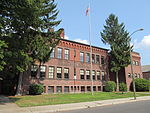Baystate Health
1883 establishments in MassachusettsAC with 0 elementsHealthcare in MassachusettsHospital networks in the United StatesHospitals established in 1883 ... and 5 more
Hospitals in Hampden County, MassachusettsMedical and health organizations based in MassachusettsNon-profit organizations based in MassachusettsOrganizations based in Springfield, MassachusettsTrauma centers
Baystate Health is a not-for-profit integrated health system headquartered in Springfield, Massachusetts, serving Western Massachusetts and the Knowledge Corridor Region of Massachusetts and Connecticut. The system has 5 hospitals, over 80 medical practices, and 25 reference laboratories. With 12,000 employees including 1,600 physicians, it is one of Massachusetts' largest employers. Baystate also owns the for-profit insurer Health New England.
Excerpt from the Wikipedia article Baystate Health (License: CC BY-SA 3.0, Authors).Baystate Health
Chestnut Street, Springfield
Geographical coordinates (GPS) Address Phone number Website External links Nearby Places Show on map
Geographical coordinates (GPS)
| Latitude | Longitude |
|---|---|
| N 42.121166666667 ° | E -72.603444444444 ° |
Address
Baystate Medical Center
Chestnut Street 759
01199 Springfield
Massachusetts, United States
Open on Google Maps









